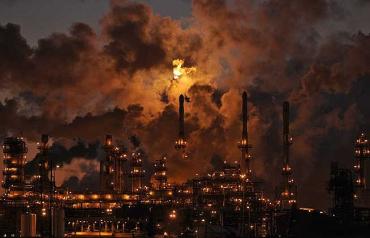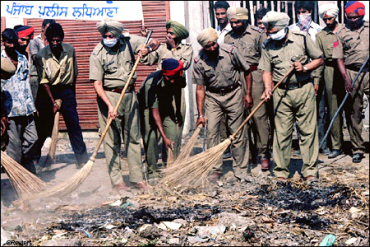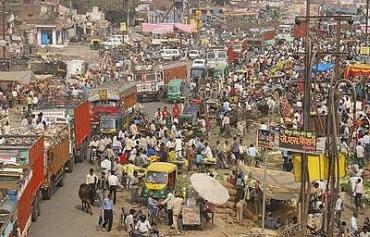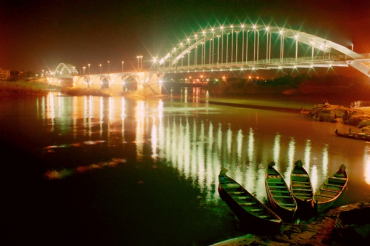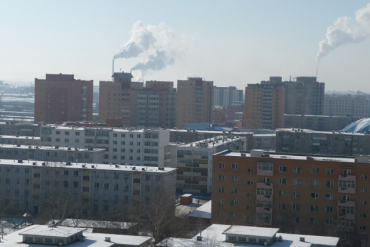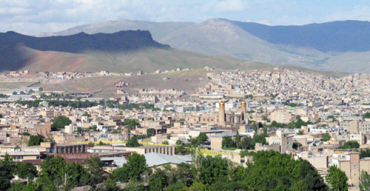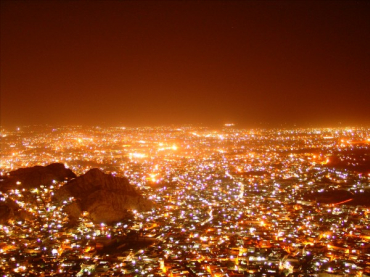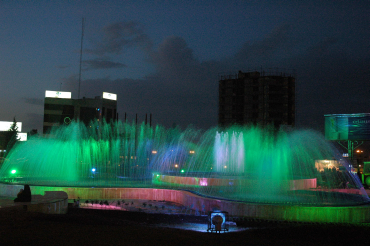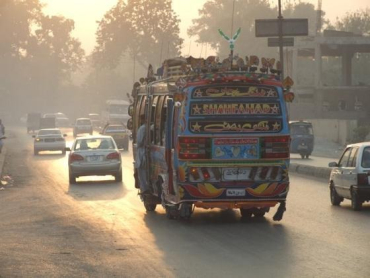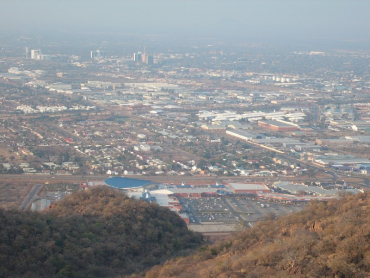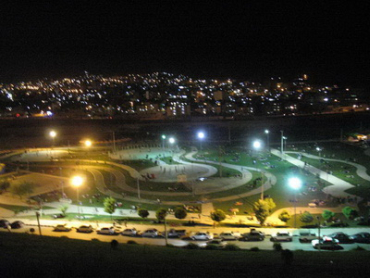 | « Back to article | Print this article |
Two Indian cities among world's most polluted
The World Health Organization estimates 1.34 million people died in 2008 from breathing in the tiny particles present in polluted outdoor air.
There are serious health consequences to air pollution. PM10 particles, or particles of 10 micrometers or less, enter the air and are breathed in by people.
These particles eventually enter the bloodstream, where they can cause heart disease, lung cancer, asthma and acute lower respiratory infections.
The WHO estimates 1.34 million people died in 2008 from breathing in tiny particles present in polluted outdoor air. This is up from 1.15 million deaths in 2004.
Let us have a look at world's 10 most polluted cities, including two from India, according to the WHO.
These cities have at least 10 times the amount of air particles recommended by the WHO - 20 µg/m3.
Click NEXT to see which two Indian cities are among the most polluted...
Two Indian cities among world's most polluted
Ludhiana, India
World ranking: Four
Annual mean PM10 (ug/m3): 251
Population: 3,487,882
Ludhiana is a highly industrial city with manufacturing plants that produce everything from textiles to auto parts.
Unfortunately, this industry, paired with vehicular pollution, has made Ludhiana one of the most polluted cities in the world.
It currently has the fourth most polluted air in the world.
There are about 200 premature deaths each year in the city due to air pollution.
Additionally, incidence of asthma is on the rise.
Click NEXT to read more...
Two Indian cities among world's most polluted
Kanpur, India
World ranking: 10
Annual mean PM10 (ug/m3): 209
Population: 4,572,951
Kanpur is one of the largest cities in India and one of the most polluted in the world.
Worst still, the levels of air pollution in the city, which is the 10th most polluted city in the world, are on the rise.
According to the Indian Ministry of Environment and Forest, while vehicles, road dust and domestic cooking contribute to the city's high pollution level, it is the industrial sector that is the main cause.
Click NEXT to see the rest of the world's most polluted cities...
Two Indian cities among world's most polluted
1. Ahwaz, Iran
Annual mean PM10 (ug/m3): 372
Population: 1,338,126
Ahwaz, Iran, has the worst air pollution in the world, according to the WHO.
Ahwaz's particle pollution is more than 18 times the recommended WHO levels.
In 2009, a large steel manufacturing plant opened close to the city.
One study, published in MIT's technology review, blamed the "unusual development and growth of the city, heavy industrial growth, oil exploration, heavy traffic" for Ahwaz's pollution problems.
Click NEXT to read more...
Two Indian cities among world's most polluted
2. Ulaanbaatar, Mongolia
Annual mean PM10 (ug/m3): 279
Population: 2,754,685
According to the WHO, "Emissions from motor vehicles, industries, and power stations as well as road dust and household garbage burning are increasing" in Mongolia.
These factors, all of which cause pollution, are worst in Ulaanbaatar.
The city has seen a spike in birth defects and unhealthy newborns over the past few years.
Click NEXT to read more...
Two Indian cities among world's most polluted
3. Sanandaj, Iran
Annual mean PM10 (ug/m3): 254
Population: 311,446
Sanandaj is located in northwestern Iran, several hundred kilometres west of capital Tehran.
The region recently suffered from crippling dust storms.
In June, the particle pollution was so severe that flights were cancelled.
The city's reported annual large particle concentration is more than 12 times the WHO's recommended upper limit.
Click NEXT to read more...
Two Indian cities among world's most polluted
4. Quetta, Pakistan
Annual mean PM10 (ug/m3): 251
Population: 896,090
Quetta's air is extremely polluted due to recent increases in construction activities and smoke emission from motor vehicles and industrial units.
Iron mills that use lead, municipal wastes and the use of insecticides are also contributing factors.
The death rate as a result of automobile pollution has increased greatly over the past few years.
Click NEXT to read more...
Two Indian cities among world's most polluted
5. Kermanshah, Iran
Annual mean PM10 (ug/m3): 229
Population: 822,921
The industrialization of western Iran has had significant environmental impact on the city of Kermanshah.
Even worse is the city's dust problem.
The dust has caused a number of people to be taken to hospitals for respiratory and heart problems.
Click NEXT to read more...
Two Indian cities among world's most polluted
6. Peshawar, Pakistan
Annual mean PM10 (ug/m3): 219
Population: 3,625,000
Peshawar is another city that suffers greatly from its vehicle use.
Few, if any, of the vehicles in the city have catalytic converters, which transform toxic exhaust emissions into nontoxic emissions.
Burning of municipal solid wastes is also a contributing factor, as are smoke emissions from brick kilns, of which Peshawar has about 350.
Click NEXT to read more...
Two Indian cities among world's most polluted
7. Gaborone, Botswana
Annual mean PM10 (ug/m3): 216
Population: 191,776
Gaborone's low air quality stems from the growing use of vehicles, which are often poorly maintained, used cars that produce an exceptional amount of emissions.
Air pollution is also caused by landfills where garbage is burned and by people who burn wood and even animal waste for cooking and heating.
Air pollution is therefore worst in winter because of side effects of heating.
Two Indian cities among world's most polluted
8. Yasuj, Iran
Annual mean PM10 (ug/m3): 215
Population: 96,786
Yasuj's air pollution results largely from the country's manufacturing plants.
These include a sugar processing plant and a coal-burning plant. These types of factories can release significant amounts of emissions into the air.
The city has plans to open a refinery by 2014 that will produce gasoline, kerosene, gas oil, furnace oil, liquefied gas, asphalt and sulfur. This likely will make the pollution problem worse.
